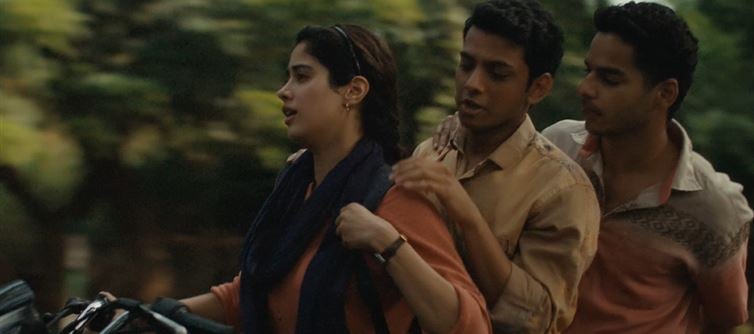
Homebound review – An Unflinching, Soul-Shaking journey of Friendship and Systemic Betrayal
Story: A Friendship Tested by a Country’s Apathy
Neeraj Ghaywan’s Homebound unfolds like a slow-burning wound—one that keeps widening as the film drags us deeper into the lives of two inseparable childhood friends from a North indian village: Mohammed Shoaib (Ishaan Khatter), a young Muslim man constantly negotiating invisibility, and Chandan Kumar (Vishal Jethwa), a Dalit boy shouldering the generational weight of fractured opportunities.
Their shared dream of joining the police force isn’t aspirational bravado; it’s a desperate, almost sacred quest for dignity in a society determined to deny them both humanity. The narrative hits its most brutal turn when the 2020 COVID-19 lockdown forces the boys—now stranded, jobless, and rapidly sinking into uncertainty—to join the migrant-worker exodus and make the punishing trek home.
What follows is a harrowing odyssey of hunger, humiliation, exhaustion, and survival—a journey that pushes their bond to its emotional limits and ends in a gut-punch of tragedy on the open highway.
Performances: Acting That Cuts Deep
The beating heart of Homebound is powered by two blazing performances. ishaan khatter delivers his career-defining role as Shoaib—measured yet explosive, fierce yet heartbreakingly fragile. He internalises the quiet chokehold of Islamophobia with nuanced brilliance. His moments of silence, especially during scenes of humiliation or helplessness, feel more powerful than any cinematic outburst could.
Vishal Jethwa is extraordinary as Chandan, playing him with raw honesty and feather-light vulnerability. His guilt of hiding his caste identity, his wide-eyed hope, and his quiet emotional storms make Chandan one of the most compelling Dalit characters written for mainstream hindi cinema in years.
Janhvi Kapoor, in her limited but sincere appearance as Sudha, leaves warmth behind, while shalini Vatsa as Chandan’s mother embodies the generational bruises of labour, poverty, and caste cruelty with devastating subtlety. Together, the cast doesn’t “act out” marginalisation—they inhabit it, and the result is profoundly moving.
Technical Brilliance: A Cinematic Gut-Punch
Pratik Shah’s cinematography is ruthlessly naturalistic. Sunlit days feel scorching and unforgiving; nights drown in darkness and dread. Wide shots reduce the characters to dust-sized figures swallowed by indifferent landscapes, while tight close-ups reveal trembling eyelashes, cracked lips, and lived-in pain.
Nitin Baid’s editing embraces slowness—forcing you to sit in the discomfort, the silence, the emptiness. The sound design leans heavily on diegetic audio: footsteps, coughing, traffic, and wind. music remains restrained, almost hesitant, appearing only in fleeting moments of hope before the world crushes it again.
The production design deserves applause for recreating a lockdown reality that still feels too fresh to revisit—abandoned roads, empty stations, suffocating shelters. Nothing looks designed; everything looks lived.
Analysis: A Brutal Mirror Held Up to the Nation
Homebound isn’t simply a film—it’s a document of abandonment, a cinematic graveyard of forgotten lives. Ghaywan doesn’t resort to melodrama; instead, he uses stillness, silence, and stark realism to expose how fragile the lives of Dalit and Muslim citizens become when systems meant to protect them turn predatory or indifferent.
The film also unpacks one of the most overlooked truths of indian social hierarchy: marginalised communities often cling to uniforms, exams, and government jobs as lifelines out of humiliation. When those dreams are denied or manipulated, the collapse is existential. The collapsing system, the sudden lockdown, the bureaucratic cruelty—all of it builds to a shattering finale that will sit on your chest long after the credits roll.
What Works
• Phenomenal lead performances that feel lived, not performed
• Unsparing realism in portraying caste, class, and religious discrimination
• Devastating final act that lands with full emotional force
• Exceptional technical craft — cinematography, sound, editing
• A grounded, painful portrayal of the 2020 migrant crisis
What Doesn’t
• Slow pacing might test viewers not accustomed to realist cinema
• Janhvi Kapoor’s character deserved more depth, given the emotional weight elsewhere
• The film’s bleakness leaves little space for release, which some may find overwhelming




 click and follow Indiaherald WhatsApp channel
click and follow Indiaherald WhatsApp channel